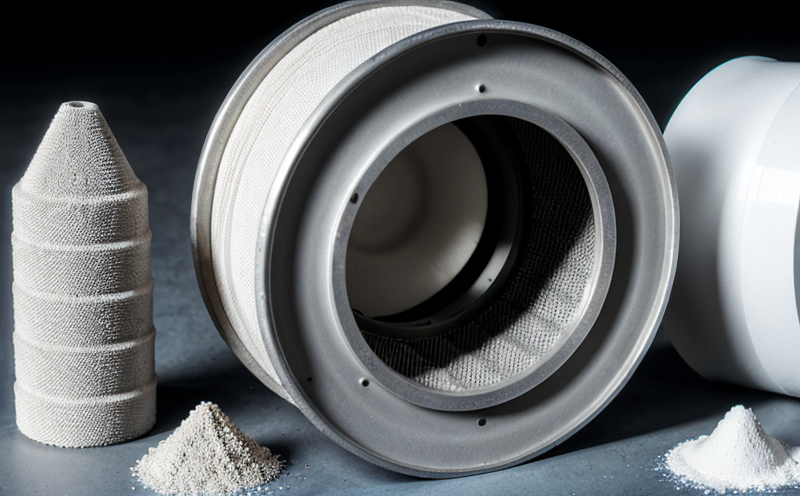ABS Rules Certification Testing of Ship Components
The American Bureau of Shipping (ABS) plays a pivotal role in ensuring maritime safety and compliance with international regulations. The ABS Rules Certification Testing of Ship Components is a critical service that guarantees the structural integrity, functional reliability, and safety of ship components. This certification process ensures that materials used in additive manufacturing meet stringent standards set forth by ABS to ensure they can withstand harsh marine environments.
The testing procedures for ABS-certified components encompass a wide range of parameters such as mechanical properties (tensile strength, yield strength, elongation), thermal stability, and chemical resistance. These tests are conducted on specimens fabricated using various additive manufacturing technologies like laser powder bed fusion, electron beam melting, and directed energy deposition.
For quality managers and compliance officers, this service is essential for ensuring that the materials used in shipbuilding meet not only ABS standards but also international maritime regulations such as ISO 17635 and ASTM F42. The process involves rigorous testing to validate the performance of additive manufactured parts under simulated marine conditions.
In addition to mechanical properties, chemical resistance is a crucial factor when selecting materials for use in ship components. The corrosive nature of seawater necessitates the use of materials that can withstand prolonged exposure without degradation. This service ensures that the materials used are not only robust but also environmentally sustainable.
The testing process involves several stages: specimen preparation, material characterization, mechanical testing, and environmental conditioning. Each stage is meticulously documented to ensure compliance with ABS guidelines. The results of these tests provide critical data for R&D engineers in optimizing design parameters and improving the overall performance of ship components.
The use of additive manufacturing offers numerous advantages over traditional manufacturing processes, including reduced material waste, faster production times, and more complex geometries. However, ensuring that these materials meet stringent safety standards is paramount. The ABS Rules Certification Testing service ensures that every component fabricated using additive manufacturing meets the highest safety and quality standards.
For procurement teams, this service provides assurance that the materials they source are not only cost-effective but also reliable and safe for use in ship components. By adhering to ABS guidelines, these teams can ensure compliance with international maritime regulations while maintaining the integrity of their supply chain.
Benefits
The benefits of ABS Rules Certification Testing are manifold. Firstly, it ensures that all materials used in additive manufacturing meet the highest standards set by ABS and other relevant international bodies. This certification enhances the reputation of both manufacturers and suppliers, ensuring their products can be trusted for use in critical maritime applications.
Secondly, this service helps to reduce costs associated with rework or failure in ship components. By identifying potential issues early in the manufacturing process, it minimizes the risk of costly delays or failures at sea. This is particularly important given the high stakes involved in marine operations.
A third benefit is the enhancement of safety standards aboard ships. Ensuring that every component meets ABS standards contributes to a safer maritime environment. This not only protects crew and passengers but also helps prevent environmental damage from accidents at sea.
The certification process also facilitates smoother compliance with international regulations, ensuring that all materials used in ship construction are up-to-date with the latest maritime safety standards. This can reduce legal risks and improve overall operational efficiency of shipping companies.
Lastly, ABS Rules Certification Testing promotes innovation by encouraging manufacturers to explore new materials and technologies for additive manufacturing. This opens up possibilities for more advanced and efficient ship components, ultimately leading to safer and more sustainable marine operations.
Customer Impact and Satisfaction
The impact of ABS Rules Certification Testing on customers is significant. By ensuring that all materials used in ship construction meet the highest standards set by ABS, customers can be confident that their ships are safe and reliable. This enhances customer satisfaction as they know that every component has been rigorously tested to ensure it meets or exceeds international maritime regulations.
For quality managers, this service provides peace of mind knowing that all components have been thoroughly tested and certified. This ensures compliance with ABS guidelines and other relevant standards, reducing the risk of non-compliance issues and associated penalties.
Compliance officers benefit from this service as it helps them to maintain a robust audit trail, demonstrating their commitment to quality and safety. This can be particularly important in maintaining good standing with regulatory bodies and ensuring smooth interactions with maritime insurance providers.
R&D engineers find value in the detailed insights provided by ABS certification testing. These insights help guide further research and development efforts, enabling continuous improvement of ship components. By leveraging these test results, they can innovate more effectively, leading to better-performing and safer ships.
For procurement teams, this service provides assurance that all materials are up-to-date with the latest maritime safety standards. This ensures a consistent supply chain, reducing risks associated with sourcing substandard or non-compliant materials.
The overall impact on customers is one of enhanced trust in their suppliers and manufacturers. By ensuring compliance with ABS guidelines, they can demonstrate their commitment to quality and safety, which is increasingly important in the competitive maritime industry.
Use Cases and Application Examples
| Component Type | Description | Application |
|---|---|---|
| Hull Structure | Welded from advanced composites, laser powder bed fusion. | Main hull structure for high-performance yachts. |
| Propeller | Manufactured using electron beam melting. | Enhanced performance and reduced weight in luxury yachts. |
| Engine Parts | Titanium alloy components for high-temperature resistance. | Critical engine parts for long-range cargo ships. |
The ABS Rules Certification Testing service ensures that these components meet the highest standards, providing peace of mind to manufacturers and operators alike. By adhering to rigorous testing protocols, this service guarantees that each component is reliable, safe, and capable of withstanding the harsh conditions of marine environments.





